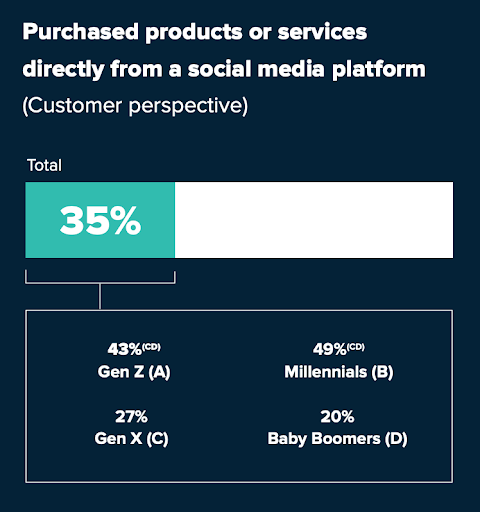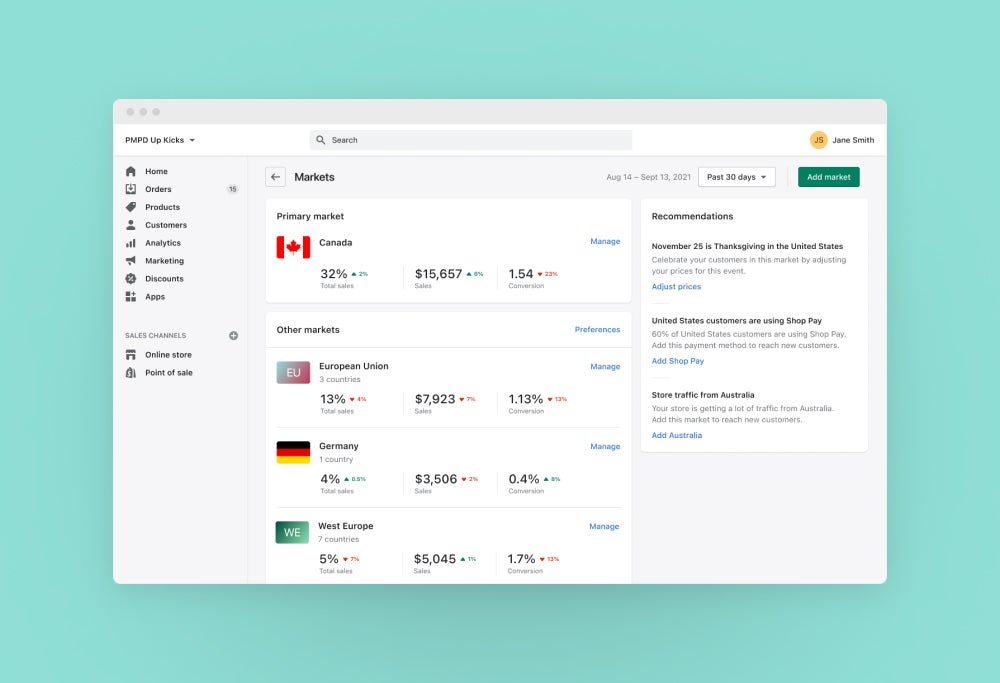Shopify is one of the most popular e-commerce platforms on the market today. It’s a versatile tool for selling products and connecting with customers online, and many small businesses love how easy it is to use. In the last several months, however, Shopify made a series of deliberate moves that quietly positioned the company as an e-commerce powerhouse for businesses of all sizes.
In four major aspects of e-commerce—checkout, social media, market reach, and advertising—Shopify has launched new products and partnerships that have strengthened the company’s leadership in the e-commerce arena:
- Shop Pay Installments enables payment flexibility
- TikTok Shopping boosts social commerce capabilities
- Shopify Markets promotes business globalization
- Roku app supports targeted TV advertising
- Shopify advances goal to make commerce better for everyone
Shop Pay Installments enables payment flexibility
The rush of Shopify announcements started in early June with the launch of Shop Pay Installments in the U.S. This feature allows customers to break up their order payments into multiple installments rather than paying the total upfront. This is a similar process to traditional financing, but it does not require customers to pay any interest or additional fees. Businesses can now offer this option to customers directly through the Shop Pay checkout portal.
The Installments feature is the direct result of Shopify’s partnership with Affirm, a leading fintech provider in the Buy Now, Pay Later (BNPL) space. The addition of BNPL functionality offers a few unique advantages, and Shop Pay Installments has already proven its value in preliminary findings.
According to the launch announcement, “one in four merchants using [Shop Pay Installments] during early access saw 50 percent higher average order value compared to other payment methods.” Merchants that have already started using the tool have also seen almost one-third (28 percent) fewer abandoned carts compared to third-party BNPL tools.
With the exception of Square, no other e-commerce platform natively supports or has plans to support BNPL technology. Retailers can manually connect third-party services like Sezzle and Klarna to their payment processing systems or e-commerce platform. However, these third-party integrations often offer less data-backed insight and can be less reliable than a natively-supported feature.
The Shop Pay Installments launch was quickly amplified when Shopify announced that the Shop Pay platform would be available to any business selling on Google, Instagram, or Facebook—regardless of whether or not they used Shopify as their e-commerce platform. Together with Affirm, Shopify has created a system that offers unprecedented flexibility to merchants and their customers.
TikTok Shopping boosts social commerce capabilities
In late August, Shopify revealed a new and somewhat unlikely collaboration with TikTok in the form of TikTok Shopping. “For the first time,” the press release states, “Shopify merchants with a TikTok For Business account will soon be able to add a shopping tab to their TikTok profiles and sync their product catalogues to create a mini-storefront that links directly to their online store for checkout.”
With minimal effort, e-retailers can add their Shopify product listings to TikTok, where customers can shop without ever leaving the app. Merchants will also be able to add Shopify product listings to organic TikTok posts as a way to harness the tremendous amount of engagement the platform generates.
It’s worth noting that this partnership is exclusive to Shopify. No other e-commerce platform—including WordPress, BigCommerce, Squarespace, and Square—supports TikTok Shopping. It’s possible that third-party plugins will come eventually, but Shopify is currently the only solution for businesses that want to turn their TikTok presence into revenue dollars.
This announcement reflects the rise in social commerce trends that have already seen some success on Facebook, Instagram, and Pinterest. A recent report, The Future of Social Media: New Data for 2021 & Beyond, found that 35 percent of survey respondents have purchased products or services directly from a social media platform. More businesses are shifting their e-commerce strategies to align with these trends, so Shopify’s TikTok integration comes at an opportune time.

Shopify Markets promotes business globalization
In mid-September, Shopify announced in a product news statement that it had launched a new feature called Shopify Markets to “remove the complexity of international commerce.” This tool is embedded in the e-commerce platform and offers a way for SMBs and large organizations alike to expand their business to new international markets with a few clicks. From one central platform, businesses can control the domain, language, currency, pricing, logistics information, and more.

This new feature makes it easier for businesses to broaden their commerce horizons, and it does so in a way that ensures their presence in each market is optimized for local interactions. For instance, localized domain and language settings benefit local SEO and create a more personalized customer experience, which in turn help drive sales conversions more broadly.
Few e-commerce platforms on the market today make it this easy to manage and grow a global business. Alternative platforms like WordPress require third-party add-ons that can be frustrating to manage, and some vendors like Square don’t offer support for international commerce at all. Shopify’s announcement offers a compelling solution for businesses that want simplicity without sacrificing opportunity.
Roku app supports targeted TV advertising
A week after the Shopify Markets announcement, Roku—a television streaming platform and hardware manufacturer—announced the launch of a new app for the Shopify App Store. This opportunity is motivated by Roku’s revenue goals for its OneView Ad Platform more than Shopify’s e-commerce functionality goals, but the announcement presents a unique opportunity for Shopify customers nonetheless.
The advertising platform operates similarly to social media or search engine advertising platforms. Once a marketer has the creative assets finalized, all they need to do is select the appropriate audience, budget, timing, and duration for the campaign. Some professional-quality video marketing ads can be made using only a smartphone—they don’t need a big budget to have big results.
Streaming services are transforming the media industry, and they are having a major impact on advertising opportunities for even the smallest of businesses. In fact, according to Roku’s press release, nearly half (49 percent) of all consumers polled in a recent study reported that “they have seen an ad on their TV streaming device that caused them to pause their TV and shop for the product online, a significant increase from 2020.”
With the new Roku integration, Shopify merchants can capitalize on this shift and reach their customers in a new and impactful way. The app is currently in public beta testing, but it is expected to be available for all Shopify customers ahead of the 2021 holiday season.
Shopify advances goal to make commerce better for everyone
All of Shopify’s recent announcements directly contribute to its mission to “make it easier to start, run, and grow a business.” The company’s robust portfolio offers solutions for branding, wholesale sourcing, drop shipping, marketing, and capital funding in addition to its acclaimed e-commerce and point of sale products.
These tools are helping businesses of all sizes reach new audiences and improve existing customer relationships, and their success is paying off: a recent report from Business Insider revealed that Shopify had more unique visitors to its site last quarter than Amazon did. The strategic timing of each new product launch or partnership announcement has made it impossible to deny that Shopify is innovating the e-commerce space with unparalleled momentum.
It’s also clear that Shopify is directly challenging limitations about what an e-commerce platform can do while still remaining an affordable solution. It has blurred the lines between the platforms that retailers use to sell products in-person and through various online channels—a tremendous benefit for small business owners who need to get the most out of their business tools. With each new innovation, Shopify is opening new doors for SMBs and expanding access to opportunities otherwise reserved for large corporations.
Read next: How to Start an Online Store on Your Current Website


